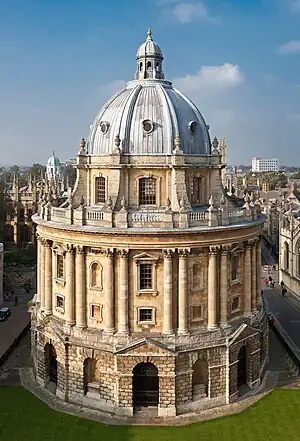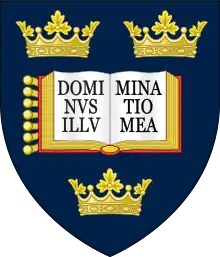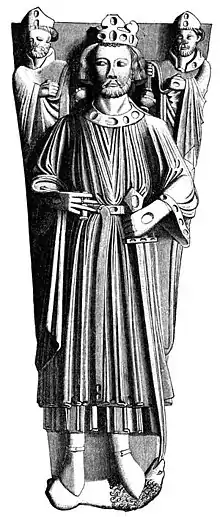The Oxfordshire Portal

Oxfordshire (/ˈɒksfədʃər, -ʃɪər/ OKS-fahd-shər, -sheer; abbreviated Oxon) is a ceremonial county in South East England. The county is bordered by Northamptonshire and Warwickshire to the north, Buckinghamshire to the east, Berkshire to the south, and Wiltshire and Gloucestershire to the west. The city of Oxford is the largest settlement and county town.
The county is largely rural, with an area of 2,605 km2 (1,006 sq mi) and a population of 691,667. After Oxford (162,100), the largest settlements are Banbury (54,355) and Abingdon-on-Thames (37,931). Oxfordshire contains five districts, which are part of a two-tier non-metropolitan county also called Oxfordshire. The part of the county south of the River Thames, largely corresponding to the Vale of White Horse district, was historically part of Berkshire.
The lowlands in the centre of the county are crossed by the River Thames and its tributaries, the valleys of which are separated by low hills. The south contains parts of the Berkshire Downs and Chiltern Hills, and the north-west includes part of the Cotswolds; all three regions are Areas of Outstanding Natural Beauty. The county's highest point is White Horse Hill (261-metre (856 ft)), part of the Berkshire Downs. (Full article...)
Selected article
The University of Oxford is a collegiate research university in Oxford, England. There is evidence of teaching as early as 1096, making it the oldest university in the English-speaking world and the world's second-oldest university in continuous operation. It grew rapidly from 1167, when Henry II banned English students from attending the University of Paris. After disputes between students and Oxford townsfolk in 1209, some academics fled north-east to Cambridge where they established what became the University of Cambridge. The two English ancient universities share many common features and are jointly referred to as Oxbridge.
The University of Oxford is made up of thirty-nine semi-autonomous constituent colleges, four permanent private halls, and a range of academic departments which are organised into four divisions. All the colleges are self-governing institutions within the university, each controlling its own membership and with its own internal structure and activities. All students are members of a college. It does not have a main campus, and its buildings and facilities are scattered throughout the city centre. Undergraduate teaching at Oxford consists of lectures, small-group tutorials at the colleges and halls, seminars, laboratory work and occasionally further tutorials provided by the central university faculties and departments. Postgraduate teaching is provided in a predominantly centralised fashion.
Oxford operates the Ashmolean Museum, the world's oldest university museum; Oxford University Press, the largest university press in the world; and the largest academic library system nationwide. In the fiscal year ending 31 July 2022, the university had a total consolidated income of £2.78 billion, of which £711.4 million was from research grants and contracts.
Oxford has educated a wide range of notable alumni, including 30 prime ministers of the United Kingdom and many heads of state and government around the world. 73 Nobel Prize laureates, 4 Fields Medalists, and 6 Turing Award winners have matriculated, worked, or held visiting fellowships at the University of Oxford, while its alumni have won 160 Olympic medals. Oxford is the home of numerous scholarships, including the Rhodes Scholarship, one of the oldest international graduate scholarship programmes. (Full article...)
Selected biography
John (24 December 1166 – 19 October 1216) was King of England from 1199 until his death in 1216. He lost the Duchy of Normandy and most of his other French lands to King Philip II of France, resulting in the collapse of the Angevin Empire and contributing to the subsequent growth in power of the French Capetian dynasty during the 13th century. The baronial revolt at the end of John's reign led to the sealing of Magna Carta, a document considered an early step in the evolution of the constitution of the United Kingdom.
John was the youngest of the four surviving sons of King Henry II of England and Duchess Eleanor of Aquitaine. He was nicknamed John Lackland (Norman French: Jean sans Terre lit. 'John without land') because he was not expected to inherit significant lands. He became Henry's favourite child following the failed revolt of 1173–1174 by his brothers Henry the Young King, Richard, and Geoffrey against the King. John was appointed Lord of Ireland in 1177 and given lands in England and on the continent. He unsuccessfully attempted a rebellion against the royal administrators of his brother, King Richard, while Richard was participating in the Third Crusade, but he was proclaimed king after Richard died in 1199. He came to an agreement with Philip II of France to recognise John's possession of the continental Angevin lands at the peace treaty of Le Goulet in 1200.
When war with France broke out again in 1202, John achieved early victories, but shortages of military resources and his treatment of Norman, Breton, and Anjou nobles resulted in the collapse of his empire in northern France in 1204. He spent much of the next decade attempting to regain these lands, raising huge revenues, reforming his armed forces and rebuilding continental alliances. His judicial reforms had a lasting effect on the English common law system, as well as providing an additional source of revenue. An argument with Pope Innocent III led to John's excommunication in 1209, a dispute he finally settled in 1213. John's attempt to defeat Philip in 1214 failed because of the French victory over John's allies at the Battle of Bouvines. When he returned to England, John faced a rebellion by many of his barons, who were unhappy with his fiscal policies and his treatment of many of England's most powerful nobles. Magna Carta was drafted as a peace treaty between John and the barons, and agreed in 1215. However, neither side complied with its conditions and civil war broke out shortly afterwards, with the barons aided by Louis VIII of France. It soon descended into a stalemate. John died of dysentery contracted while on campaign in eastern England during late 1216; supporters of his son Henry III went on to achieve victory over Louis and the rebel barons the following year.
Contemporary chroniclers were mostly critical of John's performance as king, and his reign has since been the subject of significant debate and periodic revision by historians from the 16th century onwards. Historian Jim Bradbury has summarised the current historical opinion of John's positive qualities, observing that John is today usually considered a "hard-working administrator, an able man, an able general". Nonetheless, modern historians agree that he also had many faults as king, including what historian Ralph Turner describes as "distasteful, even dangerous personality traits", such as pettiness, spitefulness, and cruelty. These negative qualities provided extensive material for fiction writers in the Victorian era, and John remains a recurring character within Western popular culture, primarily as a villain in Robin Hood folklore. (Full article...)
Topics
Selected images
Subcategories
Things to do
Find references for: A420 road | Abingdon, Oxfordshire | Abingdon School | Anthony Kitchin | Banbury | Banbury mutiny | Bicester | Bicester Community College | Blowing Stone | Boris Johnson | Brakspear | Brenda Rawnsley | Chiltern Main Line | Clanfield F.C. | Colin Greenwood | Debagging | Deddington | Degrees of the University of Oxford | Edward, the Black Prince | Edward the Confessor | European route E5
Expand: A4260 road | Alvescot | Appleton, Oxfordshire | Appleton-with-Eaton | Ardington | Ardington Wick | Arms of the University of Oxford | Ascott Earl | Ascott d'Oyley | Ashbury, Oxfordshire | Aston Rowant | Aston Upthorpe | Baldon Row | Balscote
Create: Banbury Cross Retail Park | Banbury Golf Club
WikiProjects
- Wikipedia:WikiProject University of Oxford
- Wikipedia:WikiProject England
- Wikipedia:WikiProject UK Waterways
- Wikipedia:WikiProject UK geography
Related portals
Associated Wikimedia
The following Wikimedia Foundation sister projects provide more on this subject:
-
 Commons
Commons
Free media repository -
 Wikibooks
Wikibooks
Free textbooks and manuals -
 Wikidata
Wikidata
Free knowledge base -
 Wikinews
Wikinews
Free-content news -
 Wikiquote
Wikiquote
Collection of quotations -
 Wikisource
Wikisource
Free-content library -
 Wikiversity
Wikiversity
Free learning tools -
 Wikivoyage
Wikivoyage
Free travel guide -
 Wiktionary
Wiktionary
Dictionary and thesaurus
-
 List of all portalsList of all portals
List of all portalsList of all portals -
 The arts portal
The arts portal -
 Biography portal
Biography portal -
 Current events portal
Current events portal -
 Geography portal
Geography portal -
 History portal
History portal -
 Mathematics portal
Mathematics portal -
 Science portal
Science portal -
 Society portal
Society portal -
 Technology portal
Technology portal -
 Random portalRandom portal
Random portalRandom portal -
 WikiProject PortalsWikiProject Portals
WikiProject PortalsWikiProject Portals



